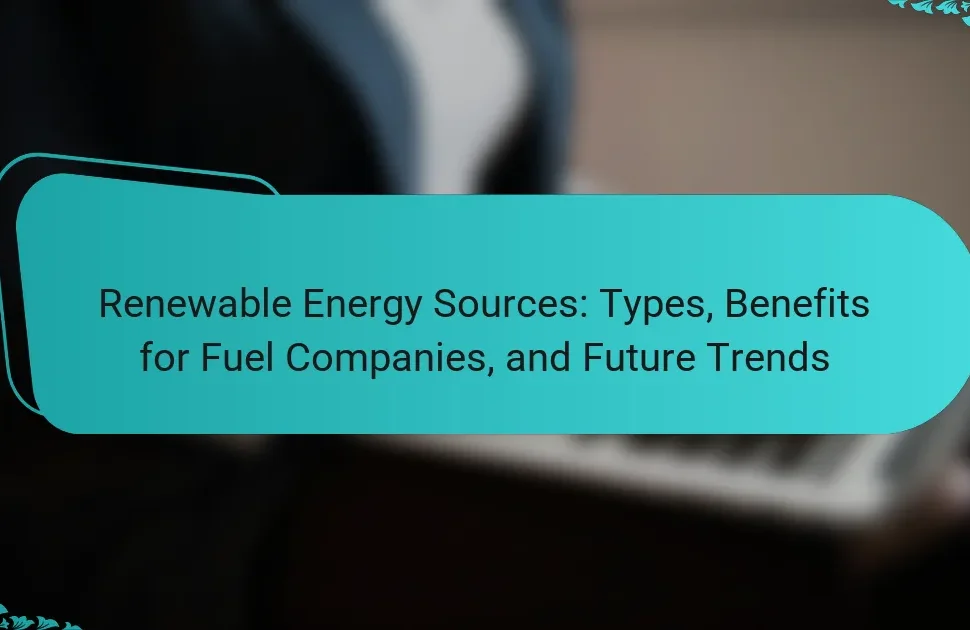
What are Innovative Biofuels?
Innovative biofuels are advanced forms of biofuels that utilize new technologies for production. They are derived from renewable biological materials, such as agricultural waste, algae, and non-food crops. Unlike traditional biofuels, innovative biofuels aim to improve efficiency and reduce environmental impact. They can be produced through processes like fermentation, gasification, and enzymatic conversion. Research indicates that innovative biofuels can significantly lower greenhouse gas emissions. For example, algae-based biofuels can reduce emissions by up to 80% compared to fossil fuels. These biofuels also contribute to energy security by diversifying energy sources. Overall, innovative biofuels represent a crucial step towards sustainable energy solutions.
How do Innovative Biofuels differ from traditional fuels?
Innovative biofuels differ from traditional fuels primarily in their source and production methods. Traditional fuels, such as gasoline and diesel, are derived from fossil fuels like crude oil. In contrast, innovative biofuels are produced from renewable biological materials, including plant biomass, algae, and waste products.
This renewable sourcing leads to lower carbon emissions during combustion. According to a study by the U.S. Department of Energy, biofuels can reduce greenhouse gas emissions by up to 80% compared to fossil fuels. Additionally, innovative biofuels can be produced through advanced processes like fermentation and gasification, which are not applicable to traditional fuels.
The versatility of biofuels also allows for various forms of intake, such as biodiesel or ethanol blends, which can be used in existing engines with little modification. This adaptability is a significant advantage over traditional fuels, which require specific refining processes.
Overall, the key differences lie in their renewable origins, production techniques, and environmental impact.
What are the key characteristics of Innovative Biofuels?
Innovative biofuels are renewable energy sources derived from organic materials. They are characterized by their ability to reduce greenhouse gas emissions compared to fossil fuels. Innovative biofuels can be produced from various feedstocks, including agricultural waste, algae, and dedicated energy crops. They often utilize advanced technologies for production, such as fermentation and gasification. These biofuels can be tailored for specific applications, including transportation and heating. Their production processes are designed to be sustainable and efficient. Innovative biofuels contribute to energy security by diversifying fuel sources. They also promote rural economic development through job creation in biofuel production and processing.
Why is the development of Innovative Biofuels important?
The development of innovative biofuels is important for reducing greenhouse gas emissions. Traditional fossil fuels contribute significantly to climate change. Innovative biofuels can lower carbon footprints by utilizing renewable resources. They can be produced from waste materials, thereby promoting sustainability. According to the International Energy Agency, biofuels could provide up to 27% of global transport energy by 2050. This shift can enhance energy security by diversifying fuel sources. Additionally, the biofuel industry can create jobs in agriculture and technology. Overall, innovative biofuels offer environmental, economic, and social benefits.
What types of Innovative Biofuels are currently available?
Innovative biofuels currently available include cellulosic ethanol, biodiesel, and algae-based fuels. Cellulosic ethanol is produced from non-food biomass, such as agricultural residues and wood chips. This type of biofuel can reduce greenhouse gas emissions by up to 86% compared to gasoline. Biodiesel is derived from vegetable oils or animal fats and can be used in diesel engines. It can lower carbon emissions by 78% compared to traditional diesel. Algae-based fuels are made from algae, which can produce high yields of oil. These biofuels can be produced on non-arable land, minimizing competition with food crops. Each type of innovative biofuel offers unique environmental and economic benefits, contributing to a sustainable energy future.
How are different types of Innovative Biofuels produced?
Innovative biofuels are produced through various processes tailored to different feedstocks. First, cellulosic biofuels are created by breaking down plant materials, such as agricultural residues and wood chips, using enzymes or chemical processes. Next, algae-based biofuels are derived from cultivating algae, which is then processed through methods like transesterification or fermentation. Third, biodiesel is produced by reacting vegetable oils or animal fats with alcohol in a process called transesterification. Additionally, ethanol is commonly produced through the fermentation of sugars from crops like corn and sugarcane. Each of these methods utilizes specific technologies and feedstocks to convert biomass into usable fuel, contributing to sustainable energy solutions.
What are the unique attributes of each type of Innovative Biofuel?
Algal biofuels have a unique attribute of high lipid content, which can exceed 50% of their weight. This makes them efficient for oil extraction. Cellulosic biofuels are characterized by their use of non-food biomass, reducing competition with food crops. They utilize lignocellulosic materials, which are abundant and often waste products.
Waste-derived biofuels are unique in their ability to convert organic waste into energy, addressing waste management issues. They often utilize anaerobic digestion or gasification processes. Ethanol from sugarcane is distinguished by its high energy yield and lower carbon footprint compared to corn-based ethanol.
Biodiesel made from waste cooking oil is unique for its sustainability and cost-effectiveness. It helps reduce waste while providing a renewable energy source. Each type of innovative biofuel presents unique attributes that enhance sustainability and energy efficiency.

What is the Environmental Impact of Innovative Biofuels?
Innovative biofuels have a positive environmental impact compared to traditional fossil fuels. They reduce greenhouse gas emissions significantly. For instance, studies show that biofuels can lower carbon dioxide emissions by up to 80% compared to gasoline. Additionally, innovative biofuels can be produced from waste materials, minimizing landfill use. This process also conserves natural resources. Furthermore, biofuels contribute to biodiversity by promoting sustainable agricultural practices. Research indicates that integrating biofuels into energy systems can enhance energy security. Overall, innovative biofuels offer a cleaner alternative with substantial ecological benefits.
How do Innovative Biofuels contribute to reducing greenhouse gas emissions?
Innovative biofuels contribute to reducing greenhouse gas emissions by providing cleaner energy alternatives to fossil fuels. They are produced from renewable resources, which means they can be replenished naturally. Unlike traditional fossil fuels, biofuels can significantly lower carbon dioxide emissions. For instance, studies show that advanced biofuels can reduce lifecycle greenhouse gas emissions by up to 80% compared to gasoline. This reduction occurs because biofuels often utilize waste materials or non-food crops, minimizing land-use change impacts. Additionally, biofuels can improve air quality by emitting fewer pollutants. The use of innovative biofuels is crucial for achieving global climate goals and transitioning to sustainable energy systems.
What are the lifecycle emissions of Innovative Biofuels compared to fossil fuels?
Lifecycle emissions of Innovative Biofuels are generally lower than those of fossil fuels. Innovative Biofuels can reduce greenhouse gas emissions by up to 80% compared to fossil fuels. This reduction is due to the renewable nature of biofuels and their ability to utilize carbon dioxide during plant growth. Studies indicate that the total greenhouse gas emissions for biofuels can be significantly lower when accounting for production, transportation, and combustion. In contrast, fossil fuels release carbon that has been stored underground for millions of years, contributing to higher overall emissions. Research from the Renewable Fuels Association shows that the lifecycle analysis of biofuels consistently demonstrates their environmental advantages over traditional fossil fuels.
What role do Innovative Biofuels play in sustainable energy practices?
Innovative biofuels play a crucial role in sustainable energy practices by providing renewable energy sources that reduce greenhouse gas emissions. They are derived from organic materials, which makes them more environmentally friendly compared to fossil fuels. According to the International Energy Agency, biofuels can reduce carbon dioxide emissions by up to 80% when produced sustainably. Innovative biofuels also contribute to energy security by diversifying energy sources and reducing dependence on oil imports. Furthermore, they support agricultural economies by creating demand for crops specifically grown for biofuel production. Studies show that the global biofuels market is expected to grow significantly, indicating a shift towards cleaner energy solutions.
What are the potential ecological effects of biofuel production?
Biofuel production can lead to significant ecological effects. Deforestation often occurs to clear land for biofuel crops. This process reduces biodiversity and disrupts ecosystems. Soil degradation may arise from intensive farming practices. Water resources can become strained due to high irrigation demands. Fertilizer and pesticide runoff can contaminate local waterways. Emissions from land-use change can contribute to greenhouse gas releases. These factors collectively impact climate stability and local wildlife. Studies indicate that these ecological effects can undermine the sustainability of biofuel as a renewable energy source.
How does land use change for biofuel crops affect biodiversity?
Land use change for biofuel crops negatively affects biodiversity. Converting natural habitats to biofuel production reduces the variety of species in those areas. This transition often leads to habitat loss and fragmentation. For instance, studies show that monoculture biofuel crops can decrease local flora and fauna diversity. The shift from diverse ecosystems to single-crop systems disrupts food webs and ecological balances. Research indicates that areas converted for biofuel cultivation experience a decline in native species. Additionally, invasive species may thrive in these altered landscapes, further threatening local biodiversity.
What are the water resource implications of biofuel production?
Biofuel production has significant water resource implications. It requires large quantities of water for crop irrigation, processing, and cooling. For instance, producing one gallon of ethanol from corn requires approximately 3,000 gallons of water. This high water demand can lead to depletion of local water supplies. Additionally, water pollution can occur from agricultural runoff and processing waste. This pollution can harm aquatic ecosystems and reduce water quality. Studies show that biofuel production can strain water resources in areas already facing scarcity. Therefore, managing water use is crucial for sustainable biofuel production.

What are the Production Processes of Innovative Biofuels?
Innovative biofuels are produced through several key processes. These processes include feedstock preparation, conversion, and refining. Feedstock preparation involves sourcing raw materials such as agricultural residues, algae, or waste oils. This step is crucial for ensuring the quality of the final biofuel product.
Conversion processes can be categorized into biochemical and thermochemical methods. Biochemical methods include fermentation and anaerobic digestion. Fermentation converts sugars into ethanol using microorganisms. Anaerobic digestion breaks down organic matter to produce biogas.
Thermochemical methods encompass gasification and pyrolysis. Gasification converts biomass into syngas through high-temperature reactions. Pyrolysis thermally decomposes organic material in the absence of oxygen to produce bio-oil.
Finally, refining processes enhance the quality of the biofuel. This may involve distillation, hydroprocessing, or transesterification. Each refining method helps improve fuel properties such as viscosity and energy density.
These production processes are essential for creating sustainable alternatives to fossil fuels. The use of innovative biofuels contributes to reducing greenhouse gas emissions and reliance on non-renewable resources.
What technologies are used in the production of Innovative Biofuels?
Innovative biofuels are produced using various technologies. These technologies include biochemical processes, thermochemical processes, and transesterification. Biochemical processes involve fermentation, where microorganisms convert biomass into ethanol or other biofuels. Thermochemical processes utilize heat and pressure to convert biomass into syngas, which can be further processed into liquid fuels. Transesterification is a chemical reaction used to produce biodiesel from oils or fats. Each of these technologies plays a crucial role in converting renewable resources into sustainable energy sources.
How does the fermentation process work in biofuel production?
Fermentation in biofuel production converts organic materials into ethanol using microorganisms. Yeast or bacteria break down sugars present in feedstocks like corn or sugarcane. This process occurs in anaerobic conditions, meaning it takes place without oxygen. The microorganisms metabolize the sugars, producing ethanol and carbon dioxide as byproducts. Typically, fermentation lasts from several hours to a few days, depending on the feedstock and conditions. The resulting ethanol can then be distilled and purified for use as biofuel. Research shows that fermentation efficiency can reach up to 90% under optimal conditions.
What are the advancements in enzymatic processes for biofuels?
Advancements in enzymatic processes for biofuels include enhanced enzyme efficiency and new enzyme discovery. Researchers have improved enzyme stability and activity under industrial conditions. This leads to higher sugar yields from biomass. Innovations like enzyme cocktails enable the breakdown of complex substrates more effectively. Genetic engineering has produced tailored enzymes for specific feedstocks. For instance, cellulases have been optimized for lignocellulosic materials. Additionally, advancements in enzyme immobilization techniques increase reusability and reduce costs. Studies indicate that these advancements can significantly lower production costs and enhance biofuel output.
What are the challenges faced in the production of Innovative Biofuels?
The challenges faced in the production of innovative biofuels include high production costs, feedstock availability, and technological limitations. High production costs hinder large-scale adoption. Feedstock availability can be inconsistent, affecting supply chains. Technological limitations include the need for advanced processing techniques. Regulatory hurdles can complicate the approval process. Market competition with fossil fuels also poses a significant challenge. Environmental impacts of feedstock cultivation can lead to sustainability concerns. These challenges collectively impact the feasibility and scalability of innovative biofuels.
How do production costs affect the viability of Innovative Biofuels?
Production costs significantly influence the viability of Innovative Biofuels. High production costs can limit market competitiveness against fossil fuels. When production expenses rise, profit margins decrease, making it challenging for companies to sustain operations. For instance, the U.S. Department of Energy reports that advanced biofuels need to achieve costs below $3 per gallon to compete effectively. Conversely, lower production costs can enhance profitability and encourage investment in biofuel technologies. Therefore, managing production costs is crucial for the long-term success of Innovative Biofuels in the energy market.
What are the technological barriers to scaling up production?
Technological barriers to scaling up production include limitations in processing efficiency and feedstock availability. Current biofuel production processes often face inefficiencies that hinder large-scale operations. For instance, enzymatic hydrolysis can be slow and costly, impacting overall productivity. Additionally, the variability in feedstock quality can lead to inconsistent outputs. Infrastructure for large-scale fermentation and distillation may also be lacking in many regions. Furthermore, the integration of advanced technologies like genetic engineering is still in developmental stages. These factors collectively restrict the ability to produce biofuels at a competitive scale.

What are the Economic Benefits of Innovative Biofuels?
Innovative biofuels provide significant economic benefits. They create jobs in agriculture, manufacturing, and distribution. According to the U.S. Department of Energy, the biofuel industry supports over 1.1 million jobs nationwide. Innovative biofuels also reduce dependence on fossil fuels, stabilizing energy prices. The production of biofuels contributes to rural economic development. It increases farmers’ income by providing new markets for crops. Additionally, biofuels can enhance energy security by diversifying energy sources. The global biofuels market is expected to reach $218.7 billion by 2025, indicating strong economic growth potential.
How do Innovative Biofuels impact local economies?
Innovative biofuels positively impact local economies by creating jobs and stimulating local industries. They promote agricultural development through the demand for feedstock, which benefits farmers. The production of biofuels often requires local resources, thus supporting regional supply chains. Research from the U.S. Department of Energy indicates that biofuel production can generate significant economic activity. For instance, every job in biofuel production can create additional jobs in related sectors. Also, biofuels can reduce dependence on imported fuels, keeping more money within the local economy. This leads to increased local investment and infrastructure development. Overall, innovative biofuels contribute to a more sustainable and resilient economic landscape.
What job opportunities are created by the biofuel industry?
The biofuel industry creates various job opportunities across multiple sectors. These include positions in agricultural production, where farmers grow biofuel feedstocks like corn and sugarcane. Jobs also exist in processing facilities that convert raw materials into biofuels. Research and development roles focus on improving biofuel technologies and processes. Additionally, there are opportunities in logistics and distribution for transporting biofuels to markets. The industry also requires skilled workers for maintenance and operation of biofuel production equipment. According to the U.S. Department of Energy, the biofuels sector supports over 850,000 jobs in the United States alone. This includes direct jobs in production and indirect jobs in related industries, demonstrating the significant economic impact of the biofuel industry.
How does biofuel production influence agricultural markets?
Biofuel production significantly influences agricultural markets by altering supply and demand dynamics. Increased demand for biofuel feedstocks, such as corn and soybeans, raises prices for these crops. This can lead to higher income for farmers but may also result in increased food prices. In the United States, the Renewable Fuel Standard mandates biofuel production, further driving crop demand. According to the U.S. Department of Agriculture, corn prices rose by over 50% between 2006 and 2013 due to biofuel demand. Additionally, land use changes occur as farmers shift from food crops to biofuel crops, impacting overall agricultural production. This transition can lead to reduced biodiversity and changes in land management practices. Ultimately, biofuel production creates a complex interplay between energy needs and food supply, influencing agricultural market stability and prices.
What are the long-term economic implications of adopting Innovative Biofuels?
Adopting innovative biofuels can lead to significant long-term economic implications. These include job creation in the renewable energy sector. According to a report by the International Renewable Energy Agency, the biofuels industry could generate millions of jobs globally by 2030. Additionally, innovative biofuels can reduce dependence on fossil fuels. This shift can stabilize energy prices and enhance energy security. Furthermore, biofuels can stimulate rural economies through agricultural development. The U.S. Department of Agriculture highlights that biofuel production can increase farm income and promote sustainable farming practices. Lastly, innovative biofuels contribute to reducing greenhouse gas emissions, which can lead to lower health care costs associated with pollution. Overall, transitioning to biofuels can foster economic resilience and sustainability.
How can Innovative Biofuels contribute to energy independence?
Innovative biofuels can significantly contribute to energy independence by reducing reliance on fossil fuels. They are derived from renewable sources, such as agricultural waste, algae, and other organic materials. This diversification of energy sources enhances national energy security. According to the U.S. Department of Energy, biofuels can replace a substantial portion of petroleum-based fuels. In 2020, biofuels contributed to nearly 10% of the transportation fuel supply in the U.S. This shift decreases vulnerability to global oil market fluctuations. Furthermore, innovative biofuels can be produced domestically, creating jobs and stimulating local economies. By investing in biofuel technology, countries can achieve greater energy autonomy and sustainability.
What potential savings can be achieved by using Innovative Biofuels?
Innovative biofuels can achieve significant savings in energy costs. These savings stem from reduced reliance on fossil fuels. The cost of producing biofuels can be lower than traditional fuels. For example, studies indicate that biofuels can reduce fuel costs by 10% to 30%. Additionally, biofuels can benefit from government subsidies and incentives, further enhancing savings. The use of biofuels can also lead to lower greenhouse gas emissions, which may reduce compliance costs with environmental regulations. Overall, the potential savings from using innovative biofuels are substantial, both economically and environmentally.
What best practices should be considered when investing in Innovative Biofuels?
Investing in innovative biofuels requires careful consideration of several best practices. First, conduct thorough market research to understand current trends and future projections. This includes analyzing demand for biofuels and identifying key players in the industry. Second, evaluate the sustainability of biofuel sources. Sustainable feedstocks reduce environmental impact and enhance long-term viability. Third, assess regulatory frameworks and incentives. Government policies can significantly affect profitability and market access. Fourth, consider technological advancements in production processes. Innovations can lower costs and improve efficiency. Lastly, engage with stakeholders, including local communities and environmental groups. Their support can facilitate project success and enhance public perception. These practices are crucial for informed investment decisions in the biofuels sector.
Innovative biofuels are advanced renewable energy sources derived from biological materials, such as agricultural waste and algae, designed to reduce greenhouse gas emissions and enhance energy security. This article examines the environmental impact of innovative biofuels, highlighting their ability to lower emissions by up to 80% compared to fossil fuels. It explores various production processes, including fermentation and gasification, and discusses the economic benefits, including job creation and energy independence. Additionally, the article addresses challenges in production and the implications for agricultural markets and local economies.




